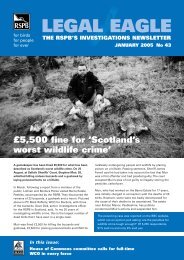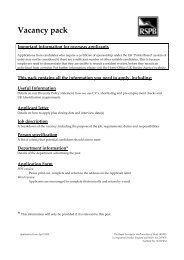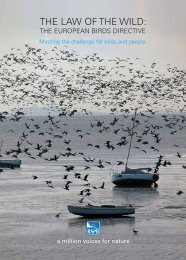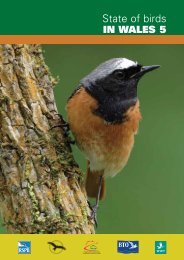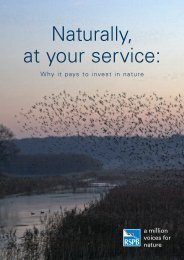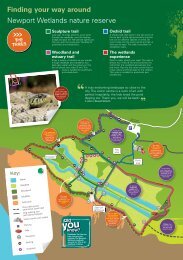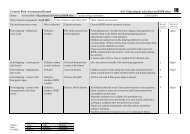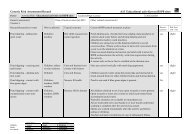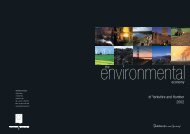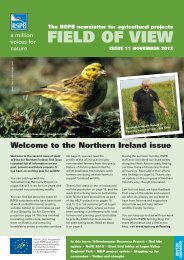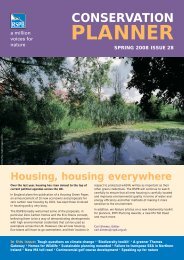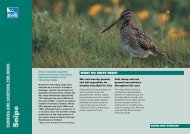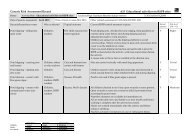annual report and accounts 2012 - RSPB
annual report and accounts 2012 - RSPB
annual report and accounts 2012 - RSPB
Create successful ePaper yourself
Turn your PDF publications into a flip-book with our unique Google optimized e-Paper software.
<strong>RSPB</strong> trustees’ <strong>report</strong> <strong>and</strong> <strong>accounts</strong> 2011-12<br />
Lancashire - the only place in Engl<strong>and</strong> where hen<br />
harriers nested successfully in 2011. We have to do<br />
more in partnership with companies, farmers <strong>and</strong><br />
other conservation charities <strong>and</strong> our fundraisers<br />
are striving to come up with new <strong>and</strong> innovative<br />
ways to fund more l<strong>and</strong> purchases.<br />
To help constrain the damaging impact on<br />
conservation of sea level rise, we undertook<br />
two major projects on the English east coast<br />
during the year. The first one was at Wallasea<br />
Isl<strong>and</strong> in Essex, where Crossrail <strong>and</strong> the<br />
Environment Agency have helped to fund<br />
the Defra-supported project to secure 155<br />
hectares of saltmarsh <strong>and</strong> mudflat as<br />
replacement habitat for that lost to “coastal<br />
squeeze”. And secondly, with financial<br />
support from the European Union, we have<br />
improved the sea defences to protect<br />
freshwater habitats at Titchwell on the<br />
Norfolk Coast.<br />
Still on the theme of water levels, further<br />
inl<strong>and</strong>, the drought in eastern Engl<strong>and</strong> badly<br />
affected wintering ducks <strong>and</strong> swans, whilst<br />
breeding waders in the Fens had their nests<br />
flooded out by the heavy spring rainfall.<br />
Careful management of water levels to try<br />
<strong>and</strong> reduce the risk to wetl<strong>and</strong> wildlife <strong>and</strong><br />
improve drought resilience is a relatively low<br />
cost way of achieving much.<br />
Within the <strong>RSPB</strong> we have been doing a lot to<br />
reduce our carbon footprint. We have used<br />
green electricity at our sites for many years<br />
<strong>and</strong> now have a number of new programmes<br />
underway - including solar, wind, biomass<br />
<strong>and</strong> heat-exchange. In the last year we added<br />
rechargeable electric vehicles to our fleet <strong>and</strong><br />
plan more. All travel undertaken by staff is<br />
monitored <strong>and</strong> we set ourselves a target of<br />
reducing the carbon footprint by 3% per<br />
person, per year – a target we regularly hit<br />
but which becomes more difficult with every<br />
passing year.<br />
The amount we spend on Education <strong>and</strong><br />
communications has been stable for the last<br />
couple of years but the amount spent<br />
probably is not the best way by which to<br />
judge the scale of much of our work. For<br />
example, new technology is driving down<br />
the cost of communication – which is a relief<br />
given the rising cost of postage – so this<br />
doesn’t mean we are doing less; we are just<br />
doing it more efficiently. Our monthly e-<br />
newsletter is a good example; we now have<br />
more than 400,000 subscribers.<br />
Trustees’ <strong>report</strong><br />
Turning to education specifically, we are<br />
consciously investing in quality rather than<br />
quantity as verified by the Government<br />
sponsored Quality Badge – 14 of our sites<br />
reached the st<strong>and</strong>ard of outst<strong>and</strong>ing or very<br />
good. And on the quantity side, we are very<br />
pleased that more than 50,000 children visited<br />
<strong>RSPB</strong> countryside classrooms in organised school<br />
groups. Minsmere’s million pound makeover<br />
(much of it funded by partners) sees a new<br />
discovery centre designed for families <strong>and</strong><br />
children with a dedicated learning facility, Wild<br />
Zone <strong>and</strong> wildwood adventure. We were taken<br />
by surprise by the level of participation in the Big<br />
Schools’ Birdwatch after widespread coverage on<br />
TV. We sent out so many packs to schools that we<br />
ended up with just eight left!<br />
These examples are just the tip of the iceberg<br />
because education, in its widest sense, needs to<br />
engage every age group. With regard to new<br />
technology mentioned earlier; we have just<br />
made our debut into the world of Smartphone<br />
technology by launching two apps: LoveNature<br />
<strong>and</strong> LoveBirds.<br />
Looking further afield, through BirdLife<br />
International we work very closely with our<br />
overseas partners. About 12% of our expenditure<br />
supports overseas conservation but about half of<br />
this is funded from money specifically donated<br />
for the purpose (from the EU or KfW - the<br />
German Development Bank for example).<br />
Support for BirdLife Malta <strong>and</strong> Cyprus to save<br />
migrant birds that use the flyway between Africa<br />
<strong>and</strong> Europe is one of our top conservation<br />
priorities. It is an issue that many <strong>RSPB</strong><br />
supporters care passionately about <strong>and</strong>, of<br />
course, success isn’t just dependant on funding;<br />
we have to change the behaviour of those<br />
involved in illegal trapping <strong>and</strong> hunting too.<br />
One the challenges we face is the pension deficit.<br />
The <strong>RSPB</strong>, like all other responsible employers,<br />
has invested considerable time <strong>and</strong> effort in<br />
finding the best solution to the complex problem<br />
of providing an affordable pension scheme for its<br />
employees. We are committed to providing a<br />
remuneration <strong>and</strong> reward package that attracts<br />
<strong>and</strong> retains the quality of people we need to<br />
deliver our conservation ambitions. We have<br />
made a number of changes over the last nine<br />
years to share the risk of pension provision more<br />
equally between staff <strong>and</strong> the <strong>RSPB</strong> <strong>and</strong> we have<br />
in place a long-term deficit recovery programme,<br />
which is agreed with the Pension Trustees. The<br />
latest triennial review is underway; in reaching<br />
an outcome we will strike a balance between the<br />
www.rspb.org.uk 19




